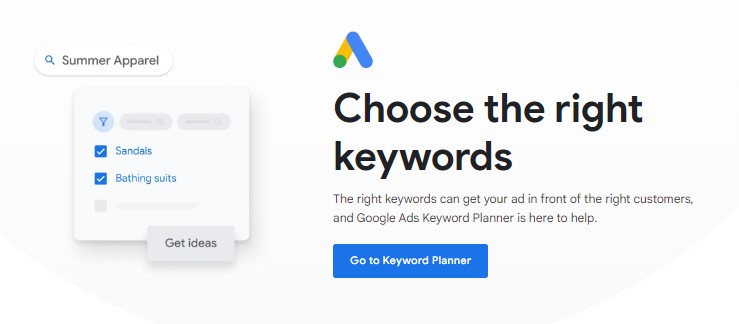December 27, 2024
Mastering Competitors Keywords and AdWords Strategy

Greg Kopyltsov
Founder
competitors keywords and adwords


In the competitive world of digital marketing, staying ahead of the curve is paramount. A well-executed Google Ads campaign can make all the difference in attracting your target audience. However, achieving optimal results requires a deep understanding of the competitive landscape. By uncovering and analyzing your competitors' keywords, you can gain invaluable insights to refine your digital marketing approach and deliver a seamless user experience.

The success of your AdWords campaigns depends on your ability to effectively target the right keywords. Your competitors are likely vying for those same valuable keywords, seeking to capture the attention of your target audience. To make the most of your ad spend and maximize your return on investment (ROI), it's essential to understand how your competitors leverage keywords in their campaigns.
By analyzing your competitors' strategies, you can identify opportunities to refine your targeting, adjust your bidding approach, and optimize your ad copy for better click-through rates.
Keywords are the backbone of digital marketing, acting as the bridge connecting users searching for specific products or services with businesses offering those solutions. Choosing the right keywords is important for ensuring that your ad copy resonates with your target audience and appears in relevant search results.
When users search for relevant terms, search engines display a list of websites and advertisements that match their search intent. The higher your website ranks in search results, the more visible your brand becomes.
By aligning your keyword strategy with user search behavior, you can optimize your campaigns for increased visibility, higher click-through rates, and ultimately, more conversions.
Monitoring your competitors' Google Ads strategies can provide valuable insights to shape your own campaigns and gain a competitive advantage. Identifying the keywords your competitors are using can help you understand their target audience and market share.
For example, if a competitor bids aggressively on certain competitor brand keywords, it indicates that those keywords are valuable to their business. This could be an opportunity for you to explore those keywords or consider alternative terms that might be less competitive but still relevant to your target audience.
By staying informed about your competitors' tactics, you can make data-driven decisions to optimize your Google Ads strategies and increase the effectiveness of your campaigns.
Identifying the keywords your competitors are using is not about copying their strategies. Instead, it is about gathering intelligence to inform your own approach and stay ahead in a competitive landscape.
When you understand which keywords drive traffic to your competitors, who your top competitors are in the paid search results, and where you have opportunities to outrank them, you can make smarter decisions about your target audience, bidding strategies, and ad copy.
Several tools and techniques provide insights into your competitors' keyword strategies. Here are some valuable methods to employ:
Google Ads Auction Insights is an invaluable tool for gaining a competitive edge. By providing access to your competitors' performance data, it offers a glimpse into their strategies and reveals potential opportunities for improving your campaigns.
Metrics such as impression share can be particularly insightful. If you notice a competitor consistently outranking you for specific keywords, it could be an indication to increase your bids, improve your ad quality, or refine your targeting settings.
By analyzing auction insights regularly, you can stay one step ahead of the competition and make data-backed adjustments to optimize your campaigns for success.

While gaining insights into your competitors' keyword strategies is crucial, it's equally important to navigate the legalities surrounding keyword usage. Using competitor brand names in a way that misleads or infringes on trademarks can lead to legal ramifications.
Understanding the difference between acceptable competitive intelligence gathering and trademark infringement is essential for ethical and legal advertising practices.
It's important to understand the legal implications of using competitor brand names as keywords. Bidding on your own brand name is crucial to ensure that your ads appear at the top of the search results when users specifically search for your brand. This helps protect your brand from competitors and maintain a strong online presence.
While bidding on your own brand name is generally acceptable, using a competitor’s brand name in your ad copy requires careful consideration. Trademark laws are designed to prevent consumer confusion and protect brand identities.
Therefore, if you choose to bid on competitor keywords, it's best to avoid using their brand names directly in your ad copy and focus on highlighting your unique selling proposition instead.
Beyond the legal aspects of keyword competition, ethical considerations also come into play. While it's acceptable to target keywords related to your competitor's products or services, misleading or deceptive practices are unethical and potentially damaging to your brand reputation.
Instead of attempting to confuse users by bidding on your competitor's brand name and mimicking their ad copy, strive to differentiate yourself by highlighting your brand's unique selling propositions. For example, free shipping, exceptional customer service, or exclusive product offerings can be powerful differentiators.
By upholding ethical advertising standards, you can build trust with your audience, strengthen your brand image, and foster long-term success.

The insights gained from analyzing your competitors' keywords should be used to enhance your AdWords campaigns strategically. Instead of simply replicating their strategies, focus on identifying opportunities to differentiate your brand and better serve the needs of your target audience.
By incorporating these insights, you can refine your bidding strategy, optimize your ad copy, and improve your overall campaign performance.
Once you've gathered insights into your competitors' keyword strategies, it's time to tailor your approach. The best approach involves using a combination of keyword research tools like Google Keyword Planner and competitor analysis tools to identify relevant keywords performing well for your competitors and align with your target audience's search intent.
Consider factors such as keyword relevance, search volume, and competition level when selecting keywords for your campaign. Utilize negative keywords to prevent your ads from appearing in irrelevant searches, ensuring that your ad spend is used effectively.
By continuously refining your keyword strategy based on competitor insights and market trends, you can achieve optimal performance and maximize your return on ad spend.
Improving the quality score of your ads is essential for enhancing visibility and reducing costs. Quality score considers factors like ad relevance, landing page experience, and expected click-through rate.
Organizing your keywords into specific ad groups based on themes or product categories can improve the relevance of your ads and boost your quality score.
By continuously monitoring and optimizing your ad campaigns, you can ensure that your ads are well-positioned to outperform the competition and drive meaningful results.
Measuring the impact of your competitor keyword strategies is crucial for determining the effectiveness of your campaigns and making necessary adjustments. Analyzing key metrics allows you to gauge how well your strategies are performing against the competition and identify areas for improvement.
Regularly monitoring these metrics provides valuable insights into your progress and guides your optimization efforts.
Various metrics can help you evaluate the effectiveness of your competitor keyword strategies. These metrics provide visibility into your performance compared to the competition and highlight areas where you can improve your approach.
By closely monitoring these metrics, you can understand what's working well and identify areas where adjustments are needed:
Metric
Description
Impression Share
The percentage of impressions your ads receive compared to the total eligible
Average Position
The average position of your ad when it's triggered by a keyword
Click-Through Rate (CTR)
The percentage of users who click on your ad after seeing it
Cost-Per-Click (CPC)
The average amount you pay each time someone clicks on your ad
Conversion Rate
The percentage of clicks that result in a desired action
Regularly review the performance of your AdWords campaigns and make adjustments based on the insights gathered. If a particular keyword or ad group is performing below expectations, consider adjusting your bids, refining your targeting, or revising your ad content.
Continuously optimizing your marketing strategy is crucial for maximizing your ad budget and achieving your desired marketing objectives. By staying informed, adaptive, and proactive, you can leverage performance insights to refine your strategies and achieve sustainable growth in the competitive landscape.
KeywordSearch has an AI Audience builder that helps you create the best ad audiences for YouTube & Google ads in seconds. In a just a few clicks, our AI algorithm analyzes your business, audience data, uncovers hidden patterns, and identifies the most relevant and high-performing audiences for your Google & YouTube Ad campaigns.
You can also use KeywordSearch to Discover the Best Keywords to rank your YouTube Videos, Websites with SEO & Even Discover Keywords for Google & YouTube Ads.
If you’re looking to SuperCharge Your Ad Audiences with AI - Sign up for KeywordSearch.com for a 5 Day Free Trial Today!
In conclusion, understanding and leveraging competitors' keywords in AdWords campaigns can significantly enhance the success of your digital advertising efforts. By strategically analyzing and incorporating competitor insights into your own keyword strategy, you can tailor your campaigns for improved performance and stay ahead in the competitive landscape. Monitoring key metrics and adjusting your AdWords strategy based on performance insights will help you optimize your campaigns effectively. Remember to navigate the legal aspects and ethical considerations of using competitors' keywords ethically. By staying informed and proactive, you can enhance your AdWords campaigns and drive better results in the digital advertising arena.
Yes, it's often legal to bid on a competitor’s brand name as a keyword, even if it’s trademarked. However, you can't use their trademark in your ad copy unless you’re a reseller or have their permission. Ensure you consult legal counsel for advice tailored to your specific situation.
The best approach is to regularly analyze your competitors' Google Ads strategies – at least monthly. Stay vigilant for industry trends and new competitors, and optimize your campaigns accordingly.
Plenty of tools are available. You can use free tools like the Google Ads interface for keyword research, or robust paid options such as SEMrush, which offers a comprehensive suite of features for competitor analysis.